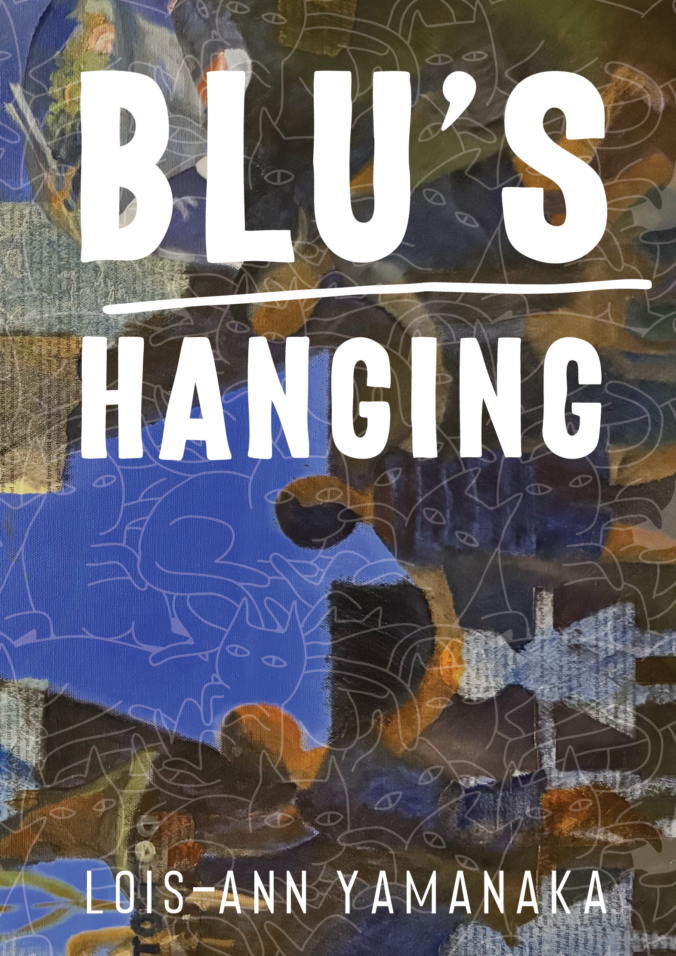
Lois-Ann Yamanaka NEWS
Blu’s Hanging
Written in the rich, multivocal pidgin of Hawai‘i, Blu’s Hanging shines with humor and expressiveness even as it shows the brutal toll of an adolescence haunted by loss. The three Ogata children are forced to grow up fast in the wake of their mother’s death. As their father falls deep into a grief-stricken stupor, 12-year-old Ivah is left to take care of her two younger siblings on her own. The only thing keeping their family together is her single-minded determination, but she must decide whether the future she wants is on the island of Moloka‘i or beyond its shores. Kaya’s new edition of this acclaimed novel, originally published in 1997, includes an interview with Yamanaka about her career and the controversies surrounding this novel, along with a contextualizing afterword by Asian American scholar erin Khuê Ninh.
praise
“Lois-Ann Yamanaka continues to reverberate through me since first meeting her on paper decades ago. Blu’s Hanging especially confirms what I know of the spirit. How shame destroys us, how love redeems us. In this novel, as in all her work, Yamanaka documents her community’s way of saying; a poetry captured from the lips of speakers—recorded, honored, and validated on the page. Who else will speak for the poor if not those who have themselves been marginalized? A brave, unflinching testimony told with that most powerful of weapons: love.” —Sandra Cisneros, The House on Mango Street
“Laborers from a constellation of homelands invented pidgin to speak a shared language, to communicate, and yet the plantation, the brutality of a system, fostered antagonism and hierarchy. Welcome to the residue of that legacy, the marginal underbelly of your vacation paradise. It’s been 28 years since Blu’s Hanging, a work of fiction, became the stigmatized center and inadvertent catalyst for a reckoning, demonstrating the power of language and literature. But what about Blu? The hungry irrepressible boy Presley Blu Ogata. Hear his sweet voice, his acapella kingdom-come pidgin jazz, rendered heartbreak and melodrama, cruelty and savage humiliation, gut punch of shame and love and dignity despite.”—Karen Tei Yamashita, I Hotel
“I reread this dark wondrous novel with renewed appreciation. In one’s innermost recesses, monsters and defenders reside. They are essential—which is why we keep them around, knowingly or not. And if we are lucky, an artist invites us into the fray with them. Here is Blu’s Hanging, where the children, as in those tales or horror movies, find the means to survive with uproar and cunning. Under Lois-Ann Yamanaka’s guidance, we enter their realm through language and landscape. No other writer has created dis kine book. I celebrate this reissue!” —Kimiko Hahn, The Ghost Forest
“Impoverished, bullied, shamed, and violated, each of her family members perseveres in his or her own way. So does Ivah, in this endearing coming-of-age story, in her search for dignity, shy and sly, heart-wrenching, often hilarious, unfailingly ‘full of grace and blood.’” —Wing Tek Lum, The Oldtimers
“[An] eye-opener . . . A touching tale of a family’s disintegration in spite of their love for one another.” —People
“This novel tugs at your heart but leaves you hopeful.” —Seventeen
“Daring . . . eloquent . . . a poignant novel . . . Yamanaka’s scrappy characters endure poverty, racism, and sexual and emotional abuse, but never lose their capacity for humor . . . Yamanaka is blessed with a poet’s ear.” —Harper’s Bazaar
“Giddy, bawdy, and genuinely moving . . . a pugent mix of poetic observation and vulgar reality, and further evidence that a literary Renaissance is brewing out in Hawaii. Here’s a novel that rejects exotic gush for an unflinching vision relayed by a unique voice.” —Kirkus Reviews
“Blu’s Hanging shows another Hawaii—pungent, fecund, and heart-breaking in its openness. Yamanaka’s child voice is real and painfully observant . . . Fried halalu fish, cats in heat, and the grassy smell of marijuana mix in a redolent concoction of dizzying physicality.” —Elle
“Lois-Ann Yamanaka fluidly explores the brutal divide between family duty and self-preservation, between the power of love and the power of shame . . . providing a redemptive conclusion that is as arresting as its characters.” —The New York Times Book Review


